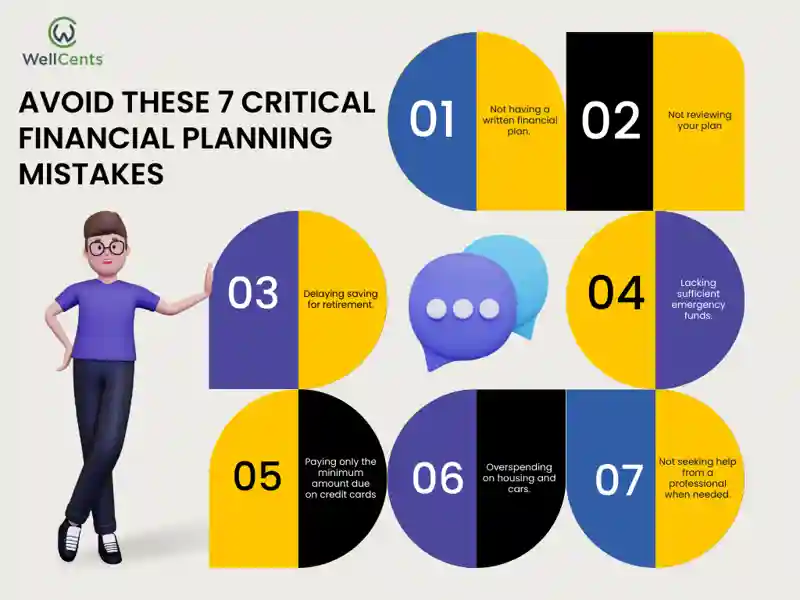
A solid plan is foundational to your financial wellness, so it’s important to get it right. Here are seven common mistakes and ways to avoid them.
1. Not having a written financial plan
The only way to know for sure that you haven’t missed anything important is to write it all down. Your financial plan should include all aspects of your personal finances, including your budget, investment targets, retirement goals, debt reduction strategy and insurance protection.
2. Not reviewing your plan
Did you make a financial plan a long time ago but haven’t looked at it since? That could be a problem. Once you’ve written everything down, meet with a qualified financial professional regularly to make sure you remain on track, and make any needed adjustments. Do this at least annually or whenever your situation changes significantly.
3. Delaying saving for retirement
It may feel like you have all the time in the world when it comes to preparing financially for retirement, but your golden years will be here before you know it. Don’t neglect this crucial part of your financial plan. Setting up automatic contributions to your 401(k) — and increasing them regularly — is one of the easiest things you can do to put yourself on track for retirement readiness.
4. Lacking sufficient emergency funds
Having to deal with an emergency can derail any financial plan — and potentially land you deeper in debt. Set up an emergency fund of at least three to six months’ worth of expenses. That way, if your vehicle or computer breaks down, you don’t have to reach for your credit cards or raid your retirement account to pay for it. Also make sure you have adequate insurance protection for your car, home and other possessions.
5. Paying only the minimum amount due on credit cards
It may be tempting to just meet the minimum obligation on your monthly credit card bills. After all, why pay more than you have to? But that reasoning falls short when you look at how it affects you in the long term. Over time, your total interest costs will be higher, and you’ll be in debt longer, if you only pay the minimum balance. In fact, card issuers are required by law to include a “minimum payment warning” on each statement, which shows you the total amount you’ll pay, including interest, if you choose to send only the minimum required amount each month. Instead, pay as much as you can above the minimum — or if possible, pay the statement balance in full.
6. Overspending on housing and cars
Housing, food and transportation are often the three largest expenses in household budgets. And overspending on any of them can make it difficult to stick to your financial plan. Many financial experts recommend spending no more than 28% of your total income on housing — and no more than 36% of your income on your total debt, including credit cards and car payments.
7. Not seeking help from a professional when needed
If you’re struggling financially, don’t just wish that things will get better. Sit down with a qualified financial professional to create a realistic and comprehensive financial plan that meets your needs and goals. Because when it comes to your financial future, a solid plan will beat out a wish every day of the week.
Sources
CNBC.com, Here’s what happens if you only pay the minimum on your credit card
Investopedia.com, 28/36 Rule: What It Is, How to Use It, Example
CNBC.com, Inflation is hitting the 3 big areas of household budgets